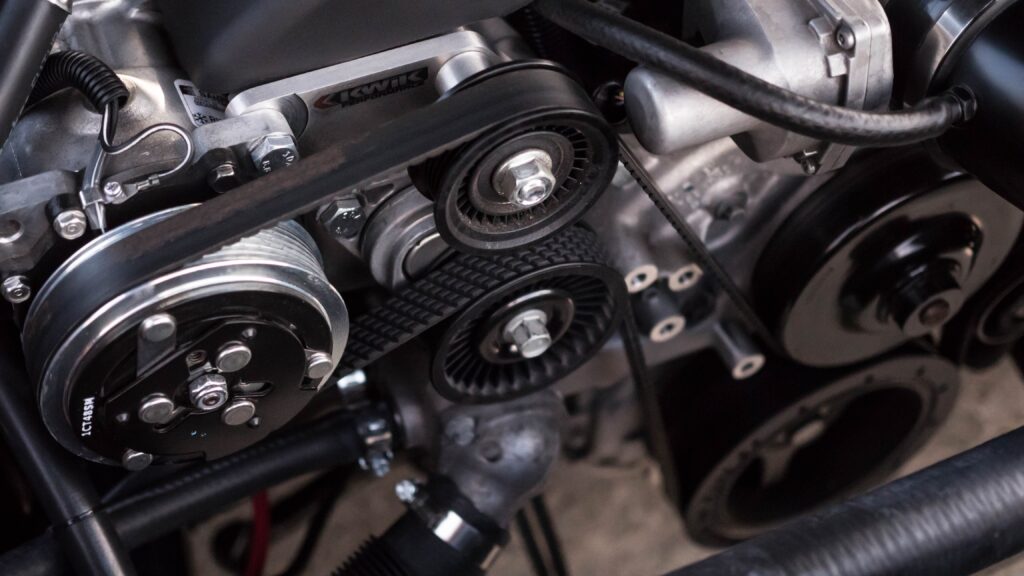Have you ever wondered how to clean your exhaust system? Taking care of your car’s exhaust system is crucial for maintaining its performance and longevity. In this article, we will explore the step-by-step process of cleaning your exhaust system, providing you with effective techniques and tips to ensure your vehicle runs smoothly and efficiently. So, if you’re ready to learn how to give your exhaust system the attention it deserves, read on!

Understanding the Exhaust System
Definition of an exhaust system
the exhaust system is a crucial component of every vehicle that is responsible for removing and expelling the toxic gases and emissions produced by the engine. It consists of various interconnected parts, including the exhaust manifold, catalytic converter, muffler, and tailpipe. Each of these components plays a vital role in ensuring the smooth operation of the vehicle’s engine and maintaining the overall performance of the vehicle.
Components of the exhaust system
- Exhaust Manifold: The exhaust manifold collects the exhaust gases from the engine cylinders and directs them into a single pipe, also known as the downpipe.
- Catalytic Converter: The catalytic converter is designed to reduce harmful emissions by converting toxic gases into less harmful substances through a series of chemical reactions.
- Muffler: The muffler is responsible for reducing the noise produced by the engine. It utilizes various chambers and baffles to dampen the sound waves generated during the combustion process.
- Tailpipe: The tailpipe serves as the final exit point for the exhaust gases, releasing them safely away from the vehicle’s occupants.
Signs of a Dirty Exhaust System
Excessive exhaust smoke
An excessively dirty exhaust system can result in the emission of thick, black smoke from the tailpipe. This thick smoke is an indication that the engine is burning an excessive amount of fuel or oil, which can be caused by a dirty exhaust system. It is important to address this issue promptly as it can lead to a decrease in fuel efficiency and overall engine performance.
Reduced power and acceleration
A dirty exhaust system can restrict the flow of exhaust gases, causing a decrease in power and acceleration. This can be observed when you feel a noticeable loss of power while accelerating or when the vehicle struggles to maintain higher speeds. Cleaning the exhaust system can help restore the optimal flow of gases, thereby improving engine performance.
Inconsistent engine noise
If you notice a change in the sound produced by your vehicle’s engine, it could be an indication of a dirty exhaust system. A clogged or dirty exhaust system can alter the engine noise, causing it to become louder, rougher, or inconsistent. By cleaning the exhaust system, you can restore the proper functioning of the components and reduce any unusual engine noises.
Importance of Cleaning the Exhaust System
Preventing build-up and blockage
over time, the exhaust system can accumulate dirt, debris, and carbon deposits, leading to the build-up of residues that can obstruct the flow of exhaust gases. Cleaning the exhaust system regularly helps prevent excessive build-up and blockage, ensuring the smooth functioning of the system and preventing potential engine issues.
Reducing harmful emissions
a dirty exhaust system can contribute to higher emissions of harmful pollutants, such as carbon monoxide and nitrogen oxides. These pollutants can have detrimental effects on both the environment and human health. By cleaning the exhaust system, you can reduce the emission of these pollutants, making your vehicle more environmentally friendly.
Enhancing performance and fuel efficiency
A clean exhaust system allows for the efficient flow of exhaust gases, which is essential for optimum engine performance. When the exhaust system is free from dirt and debris, the engine can operate more smoothly, resulting in improved power, acceleration, and overall fuel efficiency. Regular cleaning of the exhaust system can help maintain and enhance the performance of your vehicle.
Precautions Before Cleaning the Exhaust System
Wearing protective gear
Before starting the cleaning process, it is important to prioritize safety. Ensure that you wear appropriate protective gear, such as gloves and safety goggles, to protect yourself from any potential hazards or exposure to chemicals during the cleaning process.
Working in a well-ventilated area
Cleaning the exhaust system can involve the use of cleaning agents or chemicals that may emit fumes. It is crucial to work in a well-ventilated area, such as an open garage or outdoors, to minimize the inhalation of harmful vapors. Good ventilation will help ensure your safety and maintain air quality.
Disconnecting the battery
To avoid any potential electrical hazards and to prevent accidental start-up of the vehicle, it is advisable to disconnect the battery before proceeding with the cleaning process. This will eliminate the risk of electric shock and ensure your safety during the entire cleaning procedure.

Materials Needed for Cleaning the Exhaust System
Exhaust system cleaner
To effectively clean your exhaust system, you will need a suitable exhaust system cleaner. There are various products available in the market specifically designed for this purpose. It is recommended to choose a cleaner that is compatible with your vehicle’s exhaust system materials and follows the manufacturer’s instructions.
A piece of cloth or sponge
A soft cloth or sponge is essential for wiping and scrubbing the exhaust system. It should be non-abrasive to avoid scratching or damaging the surfaces of the exhaust components. The cloth or sponge will help remove dirt, grime, and carbon deposits during the cleaning process.
Water and bucket
Water is a basic necessity when cleaning the exhaust system. Fill a bucket with clean water to rinse off the exhaust system after applying the cleaner. Ensure the water is clear and free from any contaminants that could potentially stain or damage the exhaust components.
Wrench
A wrench will be required to loosen and remove the bolts holding the exhaust system in place. The appropriate size of the wrench will depend on the specific bolts used in your vehicle’s exhaust system. It is important to have the necessary tools readily available before attempting to remove the exhaust system.
Removing the Exhaust System for Cleaning
Loosening the bolts
To remove the exhaust system for cleaning, you will need to loosen the bolts securing the various components. Using the appropriate size wrench, carefully loosen the bolts while ensuring not to strain or damage them. It is important to exercise caution and follow the manufacturer’s instructions to prevent any unnecessary damage to the exhaust system.
Taking out the exhaust pipe
Once the bolts are loosened, carefully slide out the exhaust pipe from the exhaust manifold. This may require some gentle maneuvering and twisting, depending on the specific design of your exhaust system. Be careful not to exert excessive force or damage any surrounding components during this process.
Removing the muffler and catalytic converter
After the exhaust pipe is removed, you can proceed to detach the remaining components, such as the muffler and catalytic converter. These components may also be secured by bolts or clamps, so it is important to loosen and remove them according to the manufacturer’s instructions.

Cleaning Process of the Exhaust System
Applying the cleaner
Once the exhaust system components are removed, apply the exhaust system cleaner generously to the surface areas that require cleaning. Make sure to cover all sides of the components, including the inside and outside of the exhaust pipe, muffler, and catalytic converter. Follow the instructions provided by the manufacturer regarding the application and contact time of the cleaner.
Scrubbing the exhaust system
Using a soft cloth or sponge, gently scrub the surface areas of the exhaust system components. Focus on areas that have heavy dirt or carbon deposits, applying slight pressure to remove stubborn residues. Take care not to apply excessive force or use abrasive materials that may scratch or damage the surfaces.
Rinsing and drying the exhaust system
After scrubbing, rinse off the cleaner from the exhaust system components using clean water. Thoroughly rinse off any remaining residue, ensuring that all cleaning agents are completely removed. Once rinsed, dry the exhaust system components using a clean cloth or allow them to air-dry naturally before reinstalling them onto the vehicle.
Professional Exhaust System Cleaning Services
When to resort to professionals
While cleaning the exhaust system can be done as a DIY project, there may be instances where it is best to seek professional assistance. If you lack the necessary tools, expertise, or time to clean the exhaust system yourself, it is advisable to consult a professional exhaust system cleaning service. Additionally, if you encounter any complex issues or suspect significant damage, it is best to have an expert evaluate and clean your exhaust system.
Finding reliable service providers
When opting for professional exhaust system cleaning services, it is essential to find reliable and reputable service providers. Seek recommendations from friends, family, or trusted automotive experts. Research online reviews and customer feedback to ensure that you choose a service provider known for their expertise in exhaust system cleaning.
Understanding the cost and process
Before engaging a professional service, it is important to understand the cost and process involved in cleaning your exhaust system. Obtain quotes from multiple service providers to compare prices and services offered. Additionally, clarify any doubts or questions you may have regarding the cleaning process, including the products used, estimated time, and any post-cleaning maintenance recommendations.
In conclusion, understanding the exhaust system, recognizing signs of a dirty exhaust system, and comprehending the importance of cleaning it are crucial for maintaining the overall health and performance of your vehicle. By following required precautions, gathering the necessary materials, and following the step-by-step cleaning process, you can ensure a cleaner, more efficient exhaust system. When in doubt, consider seeking professional exhaust system cleaning services to guarantee the best results and prolong the longevity of your vehicle’s exhaust system.
